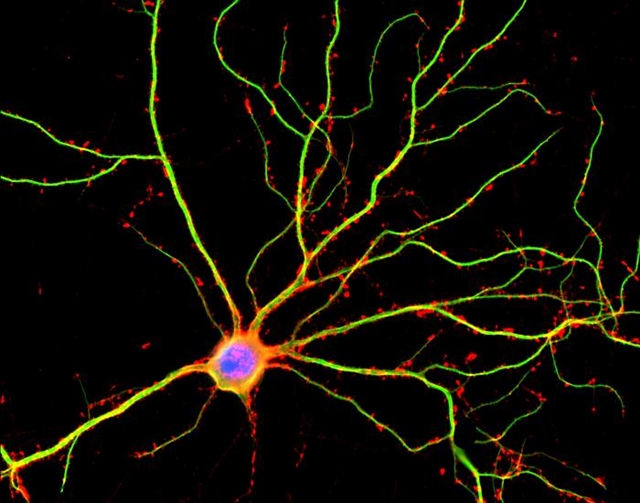8 Dec. 2020. Results of a clinical trial show a treatment for multiple sclerosis from patients’ stem cells slows progression of the disease and improves walking ability. The therapy, code-named NG-01, was developed at Hadassah Medical Center and licensed for commercialization by the company NeuroGenesis, both in Jerusalem, Israel.
Multiple sclerosis is an autoimmune condition, where the immune system attacks the central nervous system and damages myelin. Myelin is the fatty, protective substance around nerve fibers, and nerve cells themselves. Scar tissue from damaged myelin, known as sclerosis, distorts the nerve signals sent to and from the brain and spinal cord, causing symptoms ranging from mild numbness to loss of vision or paralysis.
The NeuroGenesis technology, based on research at Hadassah, takes stem cells from a patient’s bone marrow. The stem cells are cultured and engineered to express proteins that protect nerve and supporting glia cells in the brain from apoptosis or cell death. The stem cells also promote production of precursor brain cells that transform into mature nerve and glia cells, as well as reduce generation of cytokines, immune system enzymes that encourage inflammation. NG-01 is given as an injection into the spinal column, where the stem cells reach cerebrospinal fluid that flows into the brain.
The mid-stage clinical trial is testing NG-01 among 48 individuals age 18 and over with multiple sclerosis at Haddasah Medical Center. Participants are randomly assigned to receive NG-01 as a spinal column injection or an intravenous infusion — the study is evaluating both administration methods — or a placebo. After six months, the original treatment groups receive the placebo, and the first placebo group receives NG-01 by one of the two methods.
The study team is led by Dimitrios Karussis, director of the M.S. center and department of neuroimmunology and cell therapies at Hadassah Medical Center, and a founder of NeuroGenesis. The researchers are looking primarily for adverse effects from the treatments after 12 months, as well as progression of multiple sclerosis in the patients, measured on a standard expanded disability status scale. The researchers also are tracking a number of other functional tests and medical diagnostics, such as MRI scans.
Results of the trial, published in the journal Brain on 30 Nov. (paid subscription required), finds the treatments are well-tolerated and produce no serious safety issues. NG-01 recipients by either administration method also show less disease progression, as measured by the standard disability scale, than placebo recipients. In addition, more participants receiving NG-01 with spinal column injections (59%) or intravenous infusions (41%) show no evidence of M.S. disease activity than placebo recipients (10%). However, spinal column injection recipients had a lower relapse rate than intravenous recipients, when compared to placebo recipients, and scored higher on several functional tests, including time needed to walk a 25-foot distance.
“This trial provides encouraging results,” says Karussis in a NeuroGenesis statement, “and suggests a potential for a new approach that may not only slow down the progression of the disease but even induce improvement and promote repair mechanisms in progressive M.S.”
Tal Gilat, CEO of NeuroGenesis, adds, “Following recent interactions with the FDA, we look forward to confirming and expanding these findings in a large multi-center M.S. trial, and continuing advanced studies in additional indications such as ALS.”
More from Science & Enterprise:
- ALS Stem Cell Therapy Fails to Meet Trial Objective
- Group Advancing Electronic Spinal Cord Injury Therapies
- Foundations Back ALS Biomarker Study
- Stem Cell Therapy Licensed for Genetic Eye Disease
- Organoids Shown Not Developing Like Real Brains
* * *


 RSS - Posts
RSS - Posts
[…] Trial Shows Stem Cell Therapy Slows M.S. Progression […]